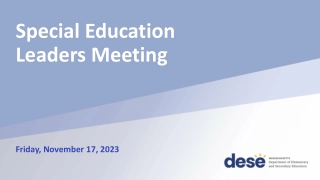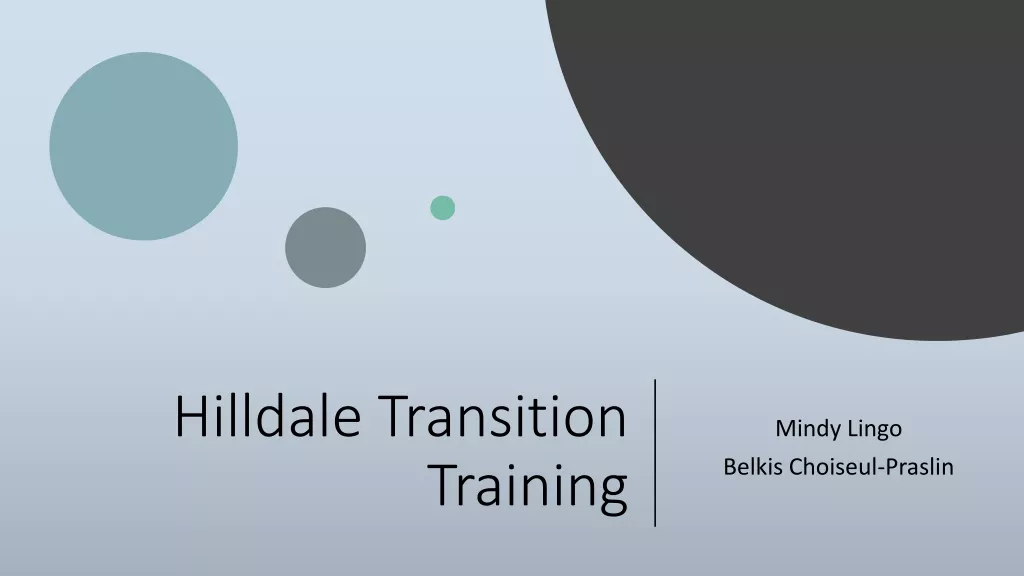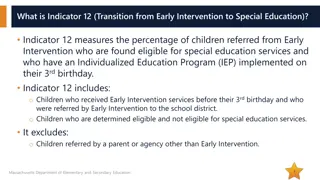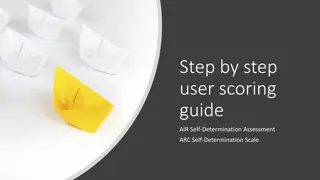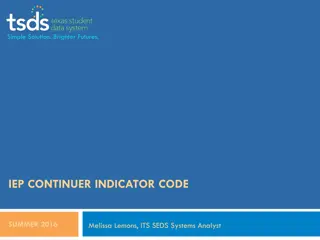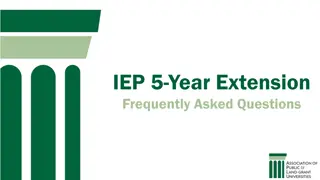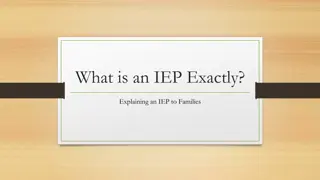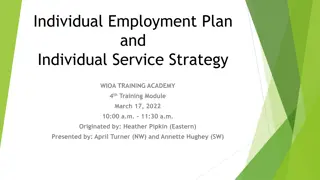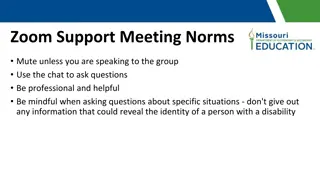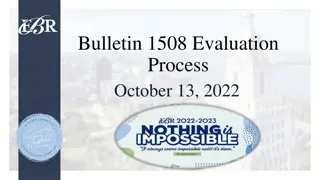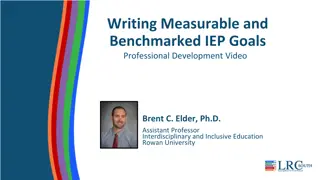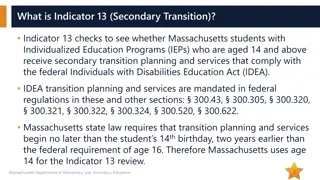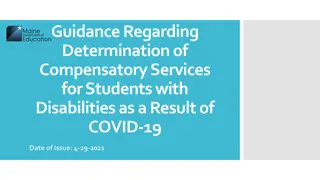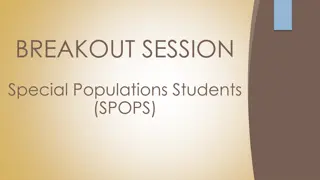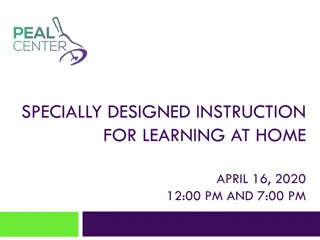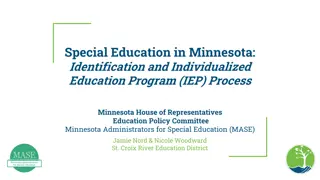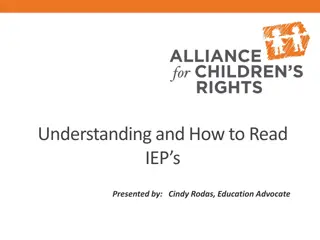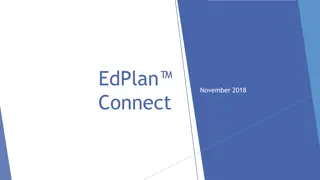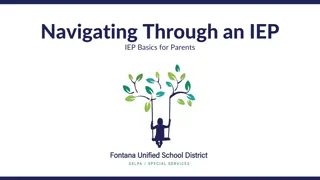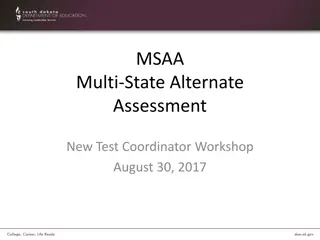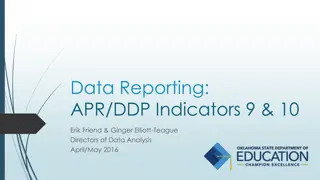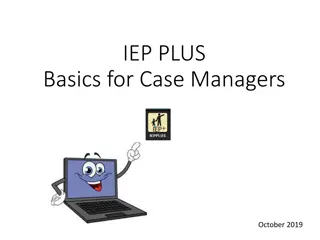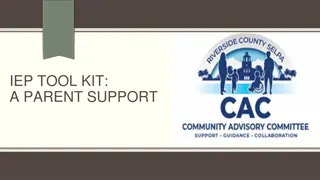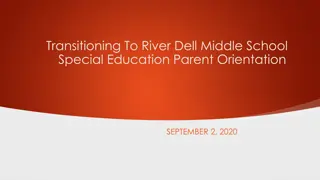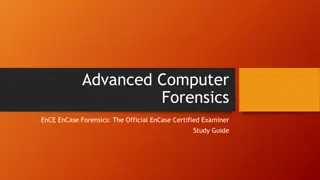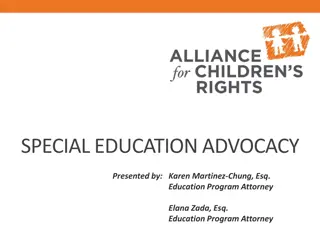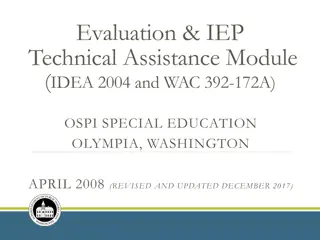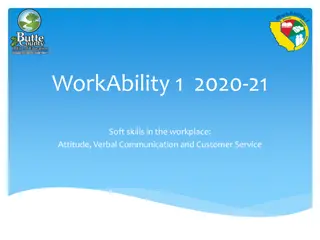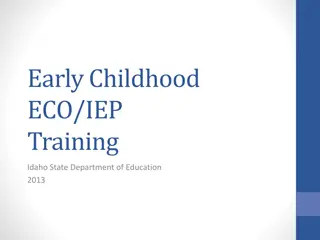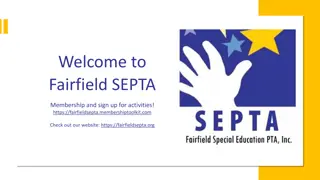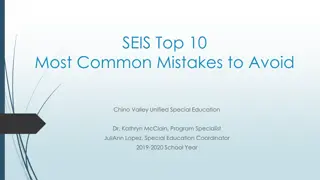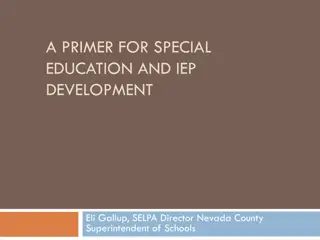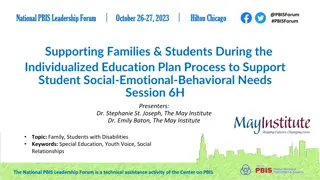Special Education Leaders Meeting Highlights & Updates
Special Education Leaders Meeting on November 17, 2023, focused on promoting inclusive and antiracist education, providing updates on referrals for students with ASD and IEP changes. DESE's Educational Vision emphasized equitable opportunities, culturally sustaining practices, and individualized sup
0 views • 46 slides
Understanding Special Education Transition: Goals, Assessments, and Legal Considerations
Exploring the purpose of special education under IDEA 2004, the importance of individualized transition plans, post-secondary goals, the role of transition assessments, and legal implications from case law decisions relating to inadequate transition planning. Key topics include Transition 101, IEP g
8 views • 151 slides
Academic Progress Monitoring for Effective Instructional Planning
Academic progress monitoring involves measuring student performance to evaluate responsiveness to interventions, guide instructional decisions, and determine when adjustments are necessary. It helps identify students needing additional support, compare instructional effectiveness, decide on changes,
2 views • 44 slides
Understanding Your Child's Individualized Education Plan (IEP) in Special Education
Fontana Special Education Local Plan Area (SELPA) is committed to providing quality educational services to students with exceptional needs. Learn about navigating IEP paperwork, the role of parental involvement, and communication strategies with the IEP team. Discover the significance of an IEP tai
1 views • 54 slides
Sweetwater Union High School District Special Services Information
Learn about the services provided by the Special Services Department at Sweetwater Union High School District for students with disabilities. Discover key contacts at school sites, the intradistrict transfer process, daily schedules, and information about holding Individualized Education Program (IE
1 views • 19 slides
Understanding Indicator 12: Transition from Early Intervention to Special Education
Indicator 12 measures the successful transition of children from Early Intervention to Special Education by evaluating the percentage of children referred from Early Intervention who are found eligible for special education services and have an Individualized Education Program (IEP) in place by thei
1 views • 6 slides
Self-Determination Assessment Scoring Guide
Comprehensive step-by-step scoring guides for the AIR Self-Determination Assessment and ARC Self-Determination Scale. The guide includes scoring examples, sections on what students do and feel, and opportunities for self-determination practice. Resources for setting new IEP goals based on assessment
0 views • 27 slides
Texas Education Code Updates for IEP Continuer Indicator
Texas Senate Bill 1867, passed during the 84th legislative session, introduced modifications to exclude students who continue enrolling in high school after expected graduation from longitudinal rates calculation if they meet specified criteria. The updated IEP-Continuer Indicator Code for the 2016-
0 views • 6 slides
IEP 5-Year Extension FAQs
The IEP 5-Year Extension Frequently Asked Questions cover important queries regarding the submission process, steps involved, contact details, turnaround time, resources, fees, deadlines, reapplication procedures, and more. Find out everything you need to know about applying for a 5-year extension f
0 views • 24 slides
Understanding Individualized Education Plans (IEP) for Student Support
Individualized Education Plans (IEP) are tailored documents developed for students with special needs, providing a roadmap for educational support. The process involves assessments by a team including parents, teachers, and administrators. Parents can request an assessment for special education serv
1 views • 23 slides
Understanding Individual Employment Plan (IEP) and Individual Service Strategy (ISS) in WIOA Training Academy
Individual Employment Plan (IEP) and Individual Service Strategy (ISS) are essential components of the WIOA Training Academy, tailored to meet the career needs of participants under various WIOA programs. IEPs focus on personalized career services for adults and dislocated workers, while ISSs are sp
1 views • 23 slides
Best Practices for Zoom Support Meeting Norms and IEP Development
Guidelines for Zoom meetings emphasize muting when not speaking, using chat for questions, and being mindful of confidentiality. IEP creation assumptions, including team engagement and data sharing, are highlighted. The end goal of IEP development is to provide FAPE and prepare students for success.
0 views • 29 slides
Understanding the Evaluation Process for Individuals with Disabilities
This information-rich content delves into the essential guidelines and procedures for evaluating students with exceptionalities under the Individuals with Disabilities Education Act (IDEA). It covers the importance of locating, identifying, and providing services to eligible students, the key partic
1 views • 12 slides
Effective Strategies for Writing and Benchmarking IEP Goals
Enhance your understanding of writing measurable IEP goals and implementing effective benchmarking techniques through this insightful professional development video by Dr. Brent C. Elder, an assistant professor at Rowan University. Learn about the importance of annual goals and benchmarks, the benef
2 views • 15 slides
Understanding Massachusetts Indicator 13 for Secondary Transition Planning
Indicator 13 in Massachusetts assesses the compliance of secondary transition planning and services for students with IEPs aged 14 and above, ensuring adherence to federal laws. The state collects data through file reviews to calculate a statewide compliance rate aiming for 100%. Compliance is measu
0 views • 5 slides
Ensuring Compensatory Services for Students with Disabilities Post-COVID-19
Educational guidance emphasizes providing compensatory services for missed specially designed instruction and related services due to the pandemic, ensuring the fulfillment of a Free Appropriate Public Education (FAPE) for students with disabilities. The individualized determination of compensatory
0 views • 16 slides
Understanding Special Populations Students in CTE Programs
Special Populations Students in Career and Technical Education (CTE) programs include individuals with disabilities, economically disadvantaged individuals, single parents, English Language Learners, migrants, homeless individuals, and more. These students may require Individualized Education Progra
0 views • 9 slides
Effective Strategies for Home Learning: Specially Designed Instruction
Discover how to define and implement Specially Designed Instruction (SDI) for home learning, including understanding different types of SDI, navigating changes to your child's Individualized Education Program (IEP), and communicating efficiently with school teams. Learn about educational rights, exp
0 views • 31 slides
Special Education Program Process in Minnesota
Explore the identification and Individualized Education Program (IEP) process in Minnesota for students with special needs. Learn about the basics, timelines, initial evaluation, ongoing process, and a tale of two students' strengths and areas of need. Discover how the IEP team develops and implemen
0 views • 38 slides
Understanding and Reading Individualized Education Plans (IEPs) by Cindy Rodas: Key Insights
Gain valuable insights on understanding and reading Individualized Education Plans (IEPs) through this educational presentation by Cindy Rodas, an Education Advocate. Learn about the components of IEPs, examples, and essential tips. Explore topics such as the basics of Special Education, identifying
0 views • 24 slides
Understanding EdPlan Connect for Parents
EdPlan Connect is a platform that allows parents to access and review their child's IEP documents, submit responses, and electronically sign documents online. Parents receive email notifications with access links to the parent portal, where they can authenticate their identity via an access code. On
6 views • 17 slides
Understanding IEP in Special Education: A Comprehensive Guide for Parents
Exploring the components and requirements of Individualized Education Programs (IEPs) in special education, this guide delves into navigating through an IEP, learning goals for educators, Fontana SELPA's mission, and understanding procedural safeguards for parents. It emphasizes the importance of pa
1 views • 39 slides
Understanding MSAA: Multi-State Alternate Assessment Overview
MSAA is a comprehensive assessment program for students in grades 3-8 and 11 with significant cognitive disabilities. It aligns with state content standards through Core Content Connectors and offers various assessment formats. Eligibility requires evidence of cognitive disability linked to curricul
0 views • 21 slides
Analysis of Disproportionate Identification in Special Education by Race and Disability
The data analysis report focuses on indicators 9 and 10, examining whether students of different racial groups are disproportionately identified as needing an IEP or a particular disability. The process involves isolating multi-race students and other racial groups to determine discrepancies in iden
0 views • 5 slides
IEP Plus Basics for Case Managers - Essential Guidelines and Tips
Discover the essential guidelines and tips for using IEP Plus as a case manager in October 2019. Learn about searching for students, creating and editing IEPs, data considerations, saving techniques, adding needs, services, and goals, and more. Enhance your efficiency in managing student IEPs with t
0 views • 23 slides
Understanding Individualized Education Programs (IEP) and Parent Support
The content provides information on Individualized Education Programs (IEP), the role of parents in supporting their child's education, and the collaborative process involved in developing an IEP. It includes details on the IEP team members, the contents of an IEP, tips for preparing for an IEP meet
0 views • 18 slides
River Dell Middle School Special Education Parent Orientation Overview
River Dell Middle School's special education parent orientation provides valuable information on support teams, counselors, administration, and the transition process for upcoming 7th-grade students. Key points include maintaining communication with case managers, services continuity in virtual sett
0 views • 34 slides
Understanding File Systems and Disk Basics in Computer Forensics
Explore the fundamentals of file systems and disk basics in computer forensics, covering topics such as disk preparation, partitioning, volume creation, file system formatting, FAT basics, and file allocation tables. Learn about disk structures, cluster allocation, and the functioning of FAT version
0 views • 24 slides
Understanding Special Education Advocacy
Special education advocacy is vital for children with disabilities to receive appropriate education services. This includes understanding what special education entails, who can make education decisions, warning signs for assessments, IEP meeting preparation, available services, and the truth about
0 views • 42 slides
Enhancing IEP Quality: Strategies and Implementation Insights
Explore how to distinguish compliant IEPs from quality IEPs through the guidance provided by the CDE IEP Procedural Manual. Learn about gathering students' strengths, preferences, and interests, and assessing their present levels of academic achievement and functional performance. Discover strategie
0 views • 18 slides
Technology Goals for IEP Implementation and Instruction
Learn how to write meaningful technology goals for Individualized Education Program (IEP) implementation and instruction, ensuring alignment with academic objectives, data-driven decisions, and empowerment of the support team. Discover the key components of a well-written AT goal and how to identify
0 views • 11 slides
Evaluation & IEP Technical Assistance Module - Special Education Overview
This module provides guidance on evaluations, IEPs, and special education for individuals with disabilities under IDEA 2004 and WAC 392-172A. It covers components, evaluations, reevaluations, prior written notice, consent, specially designed instruction, present levels, measurable annual goals, IEP
0 views • 109 slides
WorkAbility Program for High School Students
Providing career counseling, resume assistance, interview practice, and paid work experience for high school students aged 14-22 with current IEP. Eligibility criteria include having a current IEP, teacher referral, good attendance, and ability to obtain a work permit. Students can apply by filling
0 views • 14 slides
Early Childhood IEP Training Workshop Agenda
This training workshop organized by the Idaho State Department of Education in 2013 focused on helping professionals in early childhood education identify and collect information needed to complete new Early Childhood IEP practices. The agenda included sessions on screening materials, transition str
0 views • 67 slides
Extended School Year Services Application Process and Requirement Details
Learn about the Extended School Year (ESY) services application process, required forms, important deadlines for decision-making by the IEP Committee, and the Non-Participation Assurance Form. The application packets will be available in March 2015, and districts must submit all necessary forms incl
0 views • 52 slides
Fairfield SEPTA Membership Meeting Agenda and Presentation Highlights
Fairfield SEPTA November 18, 2021, meeting agenda included updates, fundraising programs, special education department report, and a presentation on substance use among IEP students. The presentation by Cathy Hazlett from Fairfield CARES highlighted core substance use measures for FPS students with
0 views • 11 slides
Avoiding Common Mistakes in Special Education IEP Processes
Understand how errors in spelling names, submitting incomplete IEPs, incorrect service dates, and other common mistakes can impact compliance. Specific guidelines are provided to ensure accurate and complete IEP documentation in Chino Valley Unified Special Education program for the 2019-2020 school
0 views • 13 slides
Understanding Special Education and IEP Development
Explore the key concepts of special education, including FAPE and the IEP process under IDEA 2004. Learn about the Least Restrictive Environment and how it ensures that students with disabilities receive appropriate education tailored to their needs while promoting inclusion. Discover the importance
0 views • 37 slides
Special Education Process and Intervention Strategies in Alabama State Department of Education
Special Education Process and Intervention Strategies in Alabama's State Department of Education involve implementing intervention strategies in the general education program before referring a child for special education evaluation. The process includes referral meetings, consent for evaluation, in
0 views • 17 slides
Enhancing Family Engagement in IEP Process
Explore strategies and solutions to improve family involvement in the Individualized Education Plan (IEP) process, focusing on supporting students with social-emotional-behavioral needs. Gain insights on collaboration, importance of families, and enhancing relationships between families, schools, an
0 views • 30 slides
